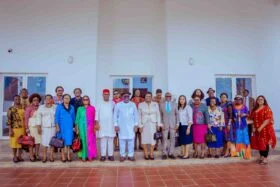FEATURES
Revisiting CBN Ban on Cryptocurrency Transactions

On February 5, the Central Bank of Nigeria (CBN) released a circular addressed to banks and other financial institutions with the directive that transactions in cryptocurrencies and facilitating payment for cryptocurrency exchanges were prohibited.
The CBN further instructed all banks and other financial institutions to identify individuals or entities that transact in cryptocurrency or operate cryptocurrency exchanges and close their accounts.
That CBN letter elicited varied reactions from the Nigerian public with many expressing concern about the potential negative effect it could have on the country’s growing cryptocurrency market and innovation in financial technology.
Some stakeholders supported the ban while others questioned the goals of the policy, which they saw as stifling the livelihood of young Nigerians using cryptocurrencies to escape poverty and unemployment.
The memo, however, created interest in some Nigerians who were hitherto unaware of the existence or workings of cryptocurrencies.
Cryptocurrency is described as a digital asset designed to work as a medium of exchange where individual coin ownership records are stored in a ledger existing in a form of computerised database.
It usually does not exist in physical form like paper money and is not issued by a central monetary authority. It uses decentralised control as opposed to centralised digital and central banking systems.
The first decentralised cryptocurrency, bitcoin, was created in 2009 by presumably pseudonymous developer Satoshi Nakamoto. In April 2011, Namecoin was created and in October 2011, Litecoin was released.
The most popular cryptocurrency transacted in Nigeria is Bitcoin, but others like Dogcoin and Ethereum are also dominant while more cryptocurrencies continue to be created from time to time.
Many youths in Nigeria have found transactions in cryptocurrencies profitable and rewarding, thus increasing its popularity.
Bitcoin and other cryptocurrencies are unregulated in many countries and their legal status is unclear. This implies that financial safety is really not guaranteed.
Converting local currencies to and from bitcoin, for instance, relies on informal brokers. Prices are usually volatile, and buying and selling are a complex processes that demand technical knowledge.
In 2017, the CBN had earlier warned that cryptocurrencies were not legal tender, and that investors were unprotected.
Findings reveal that Nigeria has accounted for crypto transaction worth N566 million dollars in the last five years.
According to the estimates, out of the top 10 countries for trading volumes Nigeria ranked third after USA and Russia in 2020, generating more than 400 million dollars worth of transactions.
Some stakeholders have urged the apex bank to revisit the ban on cryptocurrency transactions and see digital currencies as another tool for economic growth.
The Nigeria Economic Summit Group (NESG) advised the CBN to carry out a comprehensive study on the workings of cryptocurrencies to check its excesses.
According to Laoye Jaiyeola, Chief Executive Officer of the NESG, though checking excesses in its transaction was a challenge that people were grappling with across the world, cryptocurrency has come to stay.
“Cryptocurrency transaction is a challenge that people grapple with all over the world. While we institute the ban, we should undertake a comprehensive study to understand how it works.
“We have been told that they can easily be deployed to fund criminal activities, but it has come to stay, and if we are going to allow it in future, we should start learning about it now,” he advised.
In July 2020, popular Nigerian social media celebrities, Ramon Abbas (Hushppuppi) and Olalekan Ponle (Woodberry) were arrested in Dubai by the Federal Bureau of Investigation (FBI) on charges of fraud and money laundering.
According to an affidavit by the FBI, criminal proceeds from both Woodberry and Hushpuppi were converted into bitcoin, and will most likely be untraceable.
This further emphasised how convenient it could be for criminals to hide their financial crimes using cryptocurremncies.
All around the world, the decentralised nature of cryptocurrency that has made it an attraction for some investors has also made it a nightmare for regulators.
CBN, in justifying the ban, explained that cryptocurrencies transaction was devoid of proper regulation and prone to financial crimes.
Osita Nwanisobi, CBN Acting Director of Communications said that the directive was only a reminder of an earlier directive in 2017 banning cryptocurrency transactions.
He said that the anonymous nature of cryptocurrency, which made it prone to financial crimes, justified the ban.
“It is important to state that cryptocurrencies are digital or virtual currencies issued by largely anonymous entities and secured by cryptography.
“Cryptography is a method of encrypting and hiding codes that prevent oversight, accountability and regulation,” he said.
He clarified that the directive on cryptocurrency was not unique to Nigeria as countries like China, Canada, Taiwan, Indonesia, Egypt, Morocco, among others have instituted similar restrictions on its transactions.
He said that such currencies remained illegal in Nigeria because they were issued by entities that were neither licensed nor legal.
Sen. Tokunbo Abiru, representing Lagos East Senatorial District, support the ban in transaction of the Cryptocurrency in the country.
He, however, suggested that major stakeholders on cryptocurrency transaction be invited to a public hearing to appraise its advantages and its excesses.
At a joint session of relevant Senate committees on Feb. 23, Mr Godwin Emefiele, the CBN Governor further explained reasons for restricting financial institutions from engaging in crypto transactions.
Emefiele gave the assurance that the directive was not inimical to the development of technology-driven payment system in Nigeria.
He said that the Nigerian payment system had evolved significantly over the past decade, boosted by reforms driven by the CBN.
“Cryptocurrency has no place in our monetary system at this time, and cryptocurrency transactions should not be carried out through the Nigerian banking system,’’ he said.
However, Vice President Yemi Osinbajo, speaking at a recent CBN Bankers Committee Economic Summit, called for the regulation of cryptocurrency transactions in Nigeria rather than an outright ban.
Osinbajo urged the apex bank to develop a robust regulatory system to check such transactions.
“Rather than adopt a policy that prohibits cryptocurrency operations in the Nigerian banking sector, we must act with knowledge and not fear and develop a robust regulatory regime that is thoughtful and knowledge-based.
“There is no question that blockchain technology generally and cryptocurrencies, in particular, will in the coming years challenge traditional banking, including Central banking, in ways that we cannot yet imagine.
“We need to be prepared for that seismic shift. And it may come sooner than later,” he said.
Meanwhile, speaking at the 30th seminar for Finance Correspondents and Business Editors in Abuja recently, CBN Deputy Governor, Adamu Lamtek, said the bank did not ban cryptocurrency activity in the country.
Lamtek said that CBN only prohibited transactions on cryptocurrencies in the Nigerian banking sector.
He said: “the CBN did not place restrictions from use of cryptocurrencies, and we are not discouraging people from trading in them. What we have done was to prohibit transactions on cryptocurrencies in the banking sector.” (NAN)
FEATURES
Breaking the Stigma of Male Victims of GBV

For decades, the narrative around Gender-Based Violence (GBV) has been dominated by the plight of women, with men often portrayed as the perpetrators.
However, the story of John Adegoke, a 35-year-old father of two, tells a different side of this issue.
On one fateful night, Adegoke’s wife became enraged, and the situation regrettably turned violent, leaving him with a broken arm and a shattered sense of self-worth.
“I felt so ashamed and embarrassed.
I didn’t know where to turn or who to talk to. I felt like I was all alone,” he recalls.Adegoke is not the only man with such an experience.
Similarly, Michael Osunbor, a 28-year-old entrepreneur, found himself a victim of abuse.
Osunbor’s partner was emotionally and verbally abusive, constantly belittling him, calling him names, and threatening to leave.
“I felt like I was walking on eggshells around her. I never knew what would trigger her anger. I felt like I was losing myself in the relationship,” Osunbor recounts.
Both Adegoke’s and Osunbor’s stories are not isolated incidents.
In fact, according to the World Health Organisation (WHO), one in six men will experience some form of GBV in their lifetime.
Furthermore, a study by the National Demographic and Health Survey (NDHS) in Nigeria revealed that 16 per cent of men reported experiencing physical violence, while 12 per cent reported emotional violence.
In spite these alarming statistics, male victims of GBV often face significant barriers when seeking help.
Societal norms surrounding masculinity make it difficult for men to admit they are victims.
Consequently, many feel ashamed or embarrassed and may fear being perceived as weak.
Mr Sulaiman Abaya, a renowned legal practitioner, says that men also suffer domestic violence, which can take psychological, economic, or physical forms.
However, he laments the lack of recognition and support for male victims of GBV.
“Even international conventions, protocols, and charters, which are domesticated locally, focus primarily on women as victims, with little emphasis on men. This is the root of the skewed narrative,” Abaya observes.
He further explains that men are socialised to appear strong and stoic, which often discourages them from seeking help.
This stigma, in turn, leads to a lack of support services tailored to male victims.
The consequences of this silence, according to human rights advocates, can be devastating.
Male victims of GBV are more likely to suffer mental health challenges such as depression and anxiety.
Moreover, they may turn to risky behaviours, such as substance abuse, as a coping mechanism.
Dr Rosemary Smith, a human rights activist, expresses these sentiments.
She notes that societal perceptions of masculinity often force male victims to suffer in silence.
“Men who experience GBV are often left without access to the support services they need.
“This can have serious consequences for their physical and mental health, and it perpetuates a cycle of violence and silence,” she says.
Smith emphasises the need to break down the stigma surrounding male victims and dismantle stereotypes about GBV.
To achieve this, she calls for inclusive support services that address the unique needs of both men and women.
“We need to create a safe and supportive environment where men feel comfortable coming forward and seeking help.
“This requires a fundamental shift in the way we think about GBV and recognition that men can be victims too,” she explains.
Abaya suggests that collecting data on GBV against men is critical.
In addition, he advocates for robust campaigns to raise awareness and encourage men to report cases of abuse.
“Human rights agencies should begin to recognise men’s rights. There could even be dedicated platforms, such as Facebook pages, for reporting GBV against men.
“Similarly, support systems should be put in place to help male victims,” he recommends.
In addition to providing support, Mr Samuel Chukwu, a Benin-based family adviser and counsellor, underscores the importance of addressing the root causes of GBV.
He highlights the need to challenge societal norms around masculinity and power.
“We need to challenge the societal norms that perpetuate GBV and promote a culture of equality and respect.
“This requires collective efforts from the government, civil society, and individuals,” Chukwu says.
He also identifies counselling, advocacy, and other tailored forms of support as essential measures to address the issue and help victims heal.
Similarly, Mrs Christy Ipinlaye of the Olive Foundation stresses the importance of awareness.
According to her, public campaigns, community outreach, and education are key to breaking the stigma and encouraging men to report cases of abuse.
As the world concludes the 2024 16 Days of Activism Against GBV, it is vital to remember the often-overlooked victims of this societal menace.
By breaking down the stigma and providing tailored support services, society can move closer to a world where everyone lives free from violence and fear. (NANFeatures)
FEATURES
Port Harcourt Refinery: Revival Signals New Era for Nigeria

Years after it went comatose, the Port-Harcourt Refinery rose up from ‘death’, courtesy of the seriousness attached to the all-important plant by its owners, the Nigerian National Petroleum Corporation Ltd. (NNPCL).
Little did stakeholders anticipate such a milestone could be swiftly achieved, boosting Nigeria’s domestic refining capacity.
After years of delays, maintenance challenges and rising dependency on imported refined petroleum products, the inauguration of the plant promises to be a potential shift in the country’s fuel supply dynamics.
While the government and industry stakeholders have lauded the achievement, the re-establishment of the operation did not go without hydra-headed challenges.
The Port-Harcourt refinery comprises two units, with the old facility capacity of 60,000 barrels per day (bpd) and the new plant, 150,000 bpd, both summing up to 210,000 bpd.
The refinery was shut down in March 2019 for the first phase of repair works after the government secured the services of Italy’s Maire Tecnimont, to handle the review of the facility with the oil major Eni as technical adviser.
In 2021, NNPCL announced the commencement of works at the PHRC after the Federal Executive Council (FEC) approved $1.5 billion for the project.
In December 2023, the government announced the completion of the mechanical and the flare start-off, one of Nigeria’s oldest and most critical facilities, inaugurated to reduce dependency on foreign refineries.
With the capacity to process over 210,000 barrels of crude oil per day, the refinery is expected to significantly boost local production of petroleum products, including petrol, diesel and kerosene.
In a landmark move, NNPC Ltd. officially began production at the facility, signaling a return to active refining operations after years of dormancy and extensive rehabilitation work.
The christening on Nov. 26, was attended by major stakeholders: government officials and industry experts, all of who expressed optimism about the refinery’s potential to enhance domestic fuel supply and job creation.
While the inauguration is a monumental achievement, the journey to full operational capacity has not been without its noticeable hiccups.
Reports indicate that there are still several operational and logistical challenges facing the refinery, including issues with the supply of crude, infrastructure inadequacies and technical glitches.
Also, there are concerns about the refinery’s ability to operate at full capacity consistently, as its systems have suffered from years of underinvestment.
The prolonged downtime and intermittent operations have raised doubts about whether the refinery can contribute meaningfully to meeting Nigeria’s domestic fuel needs without delay.
Though the refinery’s management has acknowledged some of the identified setbacks, yet, it remains committed to resolving the issues in the short-term to avoid further disruptions.
In spite of the challenges, stakeholders within Nigeria’s oil and gas sector including Dr Ayodele Oni, a Partner at Bloomfield Law Practice, notes the reopening is a positive step towards addressing the nation’s fuel supply crisis.
Oni says the Port-Harcourt’s production is expected to significantly reduce the nation’s dependence on imported fuel, which has long been a source of concern due to the foreign exchange burden and the fluctuations in international oil prices.
According to him, for Nigeria’s local refineries, the Port-Harcourt refinery holds the promise of reducing astronomical price of fuel imports, by ultimately saving the country’s billions of dollars annually.
It is also anticipated to create thousands of jobs, both directly and indirectly through the supply chain, from transportation to distribution.
Mr Mike Osatuyi, a former National Operations Controller of the Independent Petroleum marketers Association of Nigeria (lPMAN), says by the inauguration, the refinery is expected to contribute to Nigeria’s energy security by bolstering its refining capacity.
Osatuyi says this shift can pave the way for more refineries to return to full capacity and help Nigeria meet its increasing energy demand.
According to him, the refinery’s operational success could drive the government’s push for improved infrastructure in the downstream oil and gas sector, thereby creating a more self-sufficient and sustainable energy ecosystem.
“Local businesses and citizens stand to benefit from a more stable and reliable supply of fuel, which is crucial for everyday activities and economic growth.
Also, industry observers, according to him, will be quick to predict that an efficient, fully operational Port-Harcourt refinery can lead to reduction in the country’s fuel scarcity which has led to long- queues at filling stations and rising fuel prices.
An energy expert, Mr Salisu Danjuma, explains the corporation’s assignment should not end with the Port Harcourt Refinery alone.
Danjuma notes the corporation has laid out plans to increase its capacity with the completion of the Warri and Kaduna refineries, as well as enhancing the operations of the Port Harcourt plant.
He believes the goal is to make Nigeria a net exporter of refined petroleum products, reducing the country’s dependency on imported fuels while creating a robust energy sector that can support both domestic and international demand.
According to him, while the current phase of the Port Harcourt refinery’s operations is a positive indicator of progress, NNPC Ltd. still faces the task of addressing its operational challenges and ensuring long-term sustainability.
“The government has committed to investing in more capacity expansion and technology upgrades to modernise the country’s refineries.
“The commissioning of the Port Harcourt Refinery is undoubtedly a significant step for Nigeria’s oil and gas sector, with the potential to reduce the country’s fuel import bill and improve domestic fuel supply.
“While the refinery’s operations face some initial setbacks, the initiative is hailed by stakeholders as a critical move toward enhancing the nation’s energy security, boosting economic growth, and creating employment opportunities.
“Moving forward, the full success of the Port Harcourt Refinery will depend on the NNPC Ltd.’s ability to tackle its current operational challenges, ramp up production and create a stable and efficient refining ecosystem.
“If these obstacles are overcome, Nigeria could see a transformative shift in its energy landscape, reducing its reliance on imports and promoting self-sufficiency,” he added.
Reacting, the Nigeria Union of Petroleum and Natural Gas Workers (NUPENG), acknowledged the support of President Bola Tinubu, as well as the collaborative efforts of the NNPCL Board and contractors for the successful hauling of the facility.
Its President, Mr William Akporehe, and General Secretary, Mr Afolabi Olawale, described the commencement of the crude oil processing and the dispatch of petroleum products from the refinery as a landmark achievement that resonates with the aspirations of Nigerian citizens.
The union declared that the achievement demonstrated by NNPCL’s commitment to the country’s sustainable economic growth cannot be over-emphasised.
It commended the Group Managing Director of the corporation, Mele Kyari, for steering PHRC’s rehabilitation to completion, despite numerous challenges.
Nigeria owns four refineries: two in Port Harcourt and one each in Warri and Kaduna; but they have been moribund for years despite the Turn-Around-Maintenance (TAM) efforts.
The moribund state of the local refineries pushed Nigeria to depend solely on the importation of petroleum products for domestic use for several years, constituting a major drain on the nation’s foreign reserves.
For decades, successive administrations moves at reviving the nation’s refineries to reduce dependency on petrol importation failed.
In 2015, former President Muhammadu Buhari pledged to optimise those performing below capacity and boost foreign reserves by halting importation of refined fuel.
In November 2018, that administration scheduled December 2019 as the terminal date for three of the refineries to attain full production capacity to end petroleum importation and later shifted same to 2020.
Though, while the 2020 deadline was not realised, the government had spent N10.23 billion as at June 2020 on three of the refineries which processed zero crude.
By May 2023, the Federal House of Representatives Ad-hoc Committee on the state of refineries in the country made a disclosure that the federal government had spent over N11 trillion on the rehabilitation of the refineries between 2010 to 2023.
Just August 2023, President Bola Tinubu assurance that the PHRC would become functional by December after numerous failed attempts is now a reality.(NAN)
FEATURES
Time for Nigeria to Focus on Solid Minerals Sector

Nigeria’s solid mineral sector, which was once crucial to the nation’s economy, lost that recognition immediately the nation found oil.
But, with the decreasing oil revenue, the President Bola Tinubu-led administration is revitalising the solid mineral sector and developing its infrastructure to attract foreign investments.
According to the Minister of Solid Minerals Development, Dr Dele Alake, the sector is being repositioned as a major driver of the nation’s economic growth.
As the minister strives toward achieving this goal, critical stakeholders in the industry have emphasised the need to sustain the efforts to meet the goal of diversifying the economy.
One such stakeholder, Mr Mikali Mumuni, believes that the sector has the potential to significantly create wealth and numerous employment opportunities.
Mumini, the Managing Director of Miners Communication Limited, publishers of Miner Magazine, says that the sector is “too good to be ignored”.
“Today, it is dawning upon us that we can no longer depend solely on oil because of the vagaries of international oil market.
“It has become obvious that Nigeria is now earning less and less income from oil.
“Apparently, this is the reason why successive governments have been talking of diversifying the nation’s economic base.
“One of the easiest and surest way to do this is to refocus attention on the solid minerals sector.
“The sector has the highest capacity to create multiple employment opportunities for our teeming population, particularly the youth.
“Basically, the solid mineral sector has been long neglected because of the discovery of oil which made some public policy analysts argued that oil made the nation lazy.
“The reality is dawning on the nation that the holiday is over. It is time to face the reality,” he told newsmen recently.
Mr Abidoye Abiosun, Marketing Director of Miners Communication, while corroborating Mumini, identified lithium as one solid mineral that had gained global focus.
“From what I observed, the Nigerian government is prioritising the expansion and development of its lithium resources in the country.
“The idea is to generate power without polluting the environment.
“To the best of my knowledge, lithium is the major focus in the whole world and that is why, I think, the Nigerian government is really focusing attention on its expansion and development.
“When you are looking at the area of power generation without polluting the air, creating nuisance and ecological hazard, lithium is the safest,” he said.
Abiosun speaks further on the solid mineral.
“Lithium is also the mineral resource crucial to the production of battery used in the generation of solar energy and other similar products.
“With records showing that Nigeria has a very large deposit of lithium, it should be annexed, properly looked into, and tapped so that it would be a ready-made replacement and alternative to oil.
“Lithium is a versatile element with various applications. Lithium-ion batteries power electric vehicles, mobile devices and renewable energy systems.
“This is due to their high energy density and long lifespan.
“Lithium carbonate is used as a medication to treat bipolar disorder, depression and anxiety disorders.
“Lithium is also used in nuclear reactors as a neutron absorber and in nuclear fusion research.
“Lithium oxide is used to produce specialised glass and ceramics with unique properties. Lithium-based lubricants are used in industrial applications due to their high performance and resistance to extreme temperatures.
“It has long been established that lithium-ion batteries have a high energy-to-weight ratio, making them ideal for portable electronics and electric vehicles.
“This is just as lithium-ion batteries can be charged and discharged many times without losing capacity.
“Lithium carbonate also helps stabilise mood and reduce symptoms of mental health conditions.
“Lithium’s ability to absorb neutrons makes it useful in nuclear applications.
“Lithium-based materials have high thermal resistance, making them suitable for extreme temperature applications,” he explained.
Expectedly, stakeholders have lauded government’s efforts in taking steps to reactivate mining licences and address security concerns so as to make the sector more attractive to investors.
They note that Alake has launched the mineral resources database through which anybody that is interested in investing in solid minerals could access information on which part of the country he or she could get a particular mineral or the other.
The minister said recently that investors could express interest where such lies.
The government has also created the Mining Marshall to make the different mining sites safer for investors as well as miners.
Just recently, President Bola Tinubu gave a matching order to the armed forces to redouble their efforts at curbing illegal mining.
“This, to me, is a great assurance to investors in the mining sector,” Mumuni said.
For Abiosun, the renewed interest on the mineral resources sector by Alake and the Federal Government is commendable and must be supported.
“I think it is a very good step in the right direction,” Abiosun says.
Analysts have, however, said that there is the need to review mining licences as many had been issued but not activated.
“If the government is looking at generating employment through solid mineral and mineral resources in the country, all the mining licence that have been given out, need to be activated.
“Serious investors need to invest in the sector, start action and, at the end of the day, the unemployment rate in the country would have decreased.
“We look at majority of our youths that are at home unemployed; they will have areas in which they can be useful at the mining sites and other activities that are associated with mining in the country.
“I think the Federal Government is taking the right step in the right direction,” Abiosun says.
Stakeholders have also emphasised the need for specialised media coverage to promote and support the growth of the sector.
Mumini emphasises this.
“As journalists, it is our duty to ensure that we do not lower the bar of reportage of the sector.
“This is what forced some of us to come up with the idea of the Miners Communication outfit under which we currently have a monthly news magazine solely devoted to reporting the solid mineral sector.
“It is the only magazine that is doing that in the country. We have taken the lead and we are determined to consistently do this by highlighting the diverse and vast opportunities that abound in the sector,” Mumuni says.
Abiosun notes further: “This is an aspect of journalism that has not been looked into.
“The area is a growing sector and it is a genre that we need to encourage just the way the Nigerian government is trying to encourage the mineral resources industry.” (NANFeatures)































